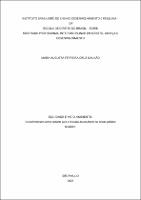Use este identificador para citar ou linkar para este item:
https://repositorio.idp.edu.br//handle/123456789/4293| Título: | Equidade e meio ambiente: o ecofeminismo como vertente para a inclusão das mulheres no debate político brasileiro |
| Autor(es): | Galvão, Mara Augusta Ferreira Cruz |
| Orientador(es): | Machado, Monica Sapucaia |
| Palavras-chave: | Mulher;Ecofeminismo;Debate político;Marcha das Margaridas |
| Data de submissão: | 2022 |
| Editor: | IDP |
| Citação: | GALVÃO, Mara Augusta Ferreira Cruz. Equidade e meio ambiente: o ecofeminismo como vertente para a inclusão das mulheres no debate político brasileiro. 2023. 137 f. (Mestrado Profissional Interdisciplinar em Direito, Justiça e Desenvolvimento). Instituto Brasileiro de Ensino, Desenvolvimento e Pesquisa, São Paulo, 2022. |
| Resumo: | Este trabalho busca entender de que forma a interseccionalidade do movimento feminista, através da conexão da mulher com a natureza, pode proporcionar a presença das mulheres no debate político no Brasil. Não se objetiva trazer o estereótipo de que as mulheres estão submissas aos homens, mas reconhecer que elas pertencem ao processo de desenvolvimento não como meras ajudantes. Para isso, questiona-se se é possível reconhecer o movimento teórico social intitulado ecofeminismo crítico como caminho para a inclusão das mulheres no debate político brasileiro, ainda que se considere que a aproximação entre mulher e meio ambiente decorre da realidade social, ou seja, da cultura imposta na sociedade. Fato é que os organismos internacionais reconhecem que a falta de equidade e igualdade de gênero constitui empecilho a uma sociedade mais sustentável, inclusive superando distorções entre igualdade e diferença de modo a valorizar a mulher, diante das suas especificidades, em sua conexão com a natureza. Assim sendo, com base na teoria ecofeminista crítica, analisou-se a Marcha das Margaridas como fenômeno que empodera as mulheres através da sua aproximação com a terra. A partir das propostas políticas apresentadas ao Poder Executivo, as Margaridas passam a ser ouvidas pelas instituições, inclusive porque suas demandas foram mola propulsora para uma série de políticas públicas inclusivas, especialmente no campo. Embora elas não se intitulem ecofeministas, é possível observar que sua íntima ligação com a natureza impulsiona a inclusão das mulheres no debate político brasileiro e pode ser a porta não convencional de entrada das mulheres na seara pública. Isso porque, uma vez optando pela defesa de fatias de problemas da sociedade, as mulheres robustecem a mobilização para promover o cumprimento dos direitos elementares, reestruturando a base cristalizada por um patriarcado através da maior legitimidade dos representantes. Seja através da educação ambiental ou aproximação com a natureza, o movimento ecofeminista crítico é capaz de dar voz ativa às mulheres para que tomem decisões em matéria de meio ambiente, afastando a natureza exploratória peculiar ao mundo capitalista. |
| Abstract: | This work seeks to understand how the intersectionality of the feminist movement, through the connection of women with nature, can provide the presence of women in the political debate in Brazil. It is not intended to bring the stereotype that women are submissive to men, but to recognize that they belong to the development process not as mere helpers. For this, it is questioned whether it is possible to recognize the social theoretical movement called critical ecofeminism as a way to include women in the Brazilian political debate, even if it is considered that the approximation between women and the environment stems from social reality, that is, from the culture imposed on society. The fact is that international organizations recognize that the lack of equity and gender equality constitutes an obstacle to a more sustainable society, including overcoming distortions between equality and difference in order to value women, given their specificities, in their connection with nature. Therefore, based on critical ecofeminist theory, the Marcha das Margaridas was analyzed as a phenomenon that empowers women through their approach to the land. Based on the political proposals presented to the Executive Branch, the Daisies started to be heard by the institutions, also because their demands were the driving force for a series of inclusive public policies, especially in the countryside. Although they do not call themselves ecofeminists, it is possible to observe that their intimate connection with nature drives the inclusion of women in the Brazilian political debate and can be the unconventional gateway for women to the public sphere. This is because, once opting for the defense of slices of society's problems, women strengthen the mobilization to promote the fulfillment of elementary rights, restructuring the base crystallized by a patriarchy through greater legitimacy of representatives. Whether through environmental education or approximation with nature, the critical ecofeminist movement is able to give women an active voice to make decisions on the environment, moving away from the exploitative nature peculiar to the capitalist world. |
| URI: | https://repositorio.idp.edu.br//handle/123456789/4293 |
| Aparece nas coleções: | Mestrado Profissional em Direito, Justiça e Desenvolvimento - São Paulo |
Arquivos associados a este item:
| Arquivo | Descrição | Tamanho | Formato | |
|---|---|---|---|---|
| DISSERTAÇÃO_MARA AUGUSTA FERREIRA CRUZ GALVÃO.pdf | 834.53 kB | Adobe PDF |  Visualizar/Abrir |
Os itens no repositório estão protegidos por copyright, com todos os direitos reservados, salvo quando é indicado o contrário.
